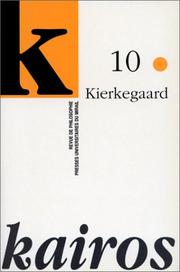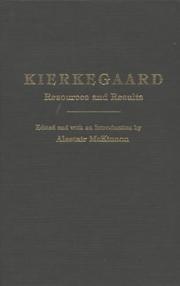| Listing 1 - 8 of 8 |
Sort by
|
Book
Year: 1965 Publisher: The Hague : M. Nijhoff,
Abstract | Keywords | Export | Availability | Bookmark
 Loading...
Loading...Choose an application
- Reference Manager
- EndNote
- RefWorks (Direct export to RefWorks)

ISSN: 11489227 ISBN: 2858163316 9782858163311 Year: 1990 Volume: 10 Publisher: Toulouse : Presses universitaires du Mirail,
Abstract | Keywords | Export | Availability | Bookmark
 Loading...
Loading...Choose an application
- Reference Manager
- EndNote
- RefWorks (Direct export to RefWorks)
Kierkegaard, Søren --- Philosophy --- Philosophie --- Periodicals --- Périodiques --- Périodiques --- Kierkegaard, Sören, --- Congresses --- Kierkegaard, Søren, --- Congresses.
Book
ISSN: 0907354X ISBN: 8778383358 9788778383358 Year: 1998 Volume: 7 Publisher: Odense Odense university press
Abstract | Keywords | Export | Availability | Bookmark
 Loading...
Loading...Choose an application
- Reference Manager
- EndNote
- RefWorks (Direct export to RefWorks)
Kierkegaard, Søren --- Kierkegaard, Sören, --- Congresses --- Kierkegaard, Sören, --- Kierkegaard, Søren, --- Congresses.
Book
ISBN: 0771702728 Year: 1993 Volume: II Publisher: Montreal : McGill University Libraries,
Abstract | Keywords | Export | Availability | Bookmark
 Loading...
Loading...Choose an application
- Reference Manager
- EndNote
- RefWorks (Direct export to RefWorks)
Philosophy, Modern --- Philosophers --- Philosophie --- Philosophes --- Bibliography --- Bibliography --- Bibliographie --- Bibliographie --- Kierkegaard, Søren, --- Kierkegaard, Sören, --- Bibliography. --- Bibliographie

ISBN: 2747520986 9782747520980 Year: 2002 Publisher: Paris : L'Harmattan,
Abstract | Keywords | Export | Availability | Bookmark
 Loading...
Loading...Choose an application
- Reference Manager
- EndNote
- RefWorks (Direct export to RefWorks)
Melancholy --- Mélancolie --- Kierkegaard, Sren, --- Kierkegaard, Sören, --- Criticism and interpretation --- Religion --- Kierkegaard, Søren, --- Mélancolie --- Kierkegaard, Sören, --- Melancholy. --- Criticism and interpretation. --- Religion. --- Kierkegaard, Søren, - 1813-1855
Book
Year: 1992 Publisher: [Palermo] : Palumbo,
Abstract | Keywords | Export | Availability | Bookmark
 Loading...
Loading...Choose an application
- Reference Manager
- EndNote
- RefWorks (Direct export to RefWorks)
Faith --- Sin --- Theodicy --- Free will and determinism --- Foi --- Péché --- Théodicée --- Libre arbitre et déterminisme --- History of doctrines --- History of doctrines --- History of doctrines --- Histoire des doctrines --- Histoire des doctrines --- Histoire des doctrines --- Kierkegaard, Søren, --- Kierkegaard, Sören, --- Criticism and interpretation. --- Critique et interprétation

ISBN: 0919401023 0889201269 9780889201262 9780919401020 0889206996 9780889206991 9780889201026 9781554585434 1554585430 Year: 1982 Publisher: [Waterloo, Ont.] Wilfrid Laurier University Press
Abstract | Keywords | Export | Availability | Bookmark
 Loading...
Loading...Choose an application
- Reference Manager
- EndNote
- RefWorks (Direct export to RefWorks)
Recently, a conference of scholars considered resources and results in Kierkegaard research. In part one, "Resources," J.C. McLelland gives a short account of the acquisition of the Malantschuk collection by McGill University, H.P. Rohde discusses the collection as a basis for research, and H. Möller comments on its accessibility to scholars. N.J. Cappelørn examines the importance of the Papirer as a resource. In part two, "Results," H.V. Hong analyzes Kierkegaard's concept of "Thought-Experiment," relating it to Kierkegaard translation. J. Walker elucidates four of Kierkegaard's assumptions concerning communication and notes the difficulties these pose for creating real human community. M. Cargignan's paper presents the concept of the "eternal" as a synthesizing force acting upon body, soul, and spirit. H.A. Nielsen distinguishes between two levels of indirect communication in Mark 6:45-52 and calls attention to the significance of this distinction for understanding Kierkegaard. The last two essays present the results of computer research at McGill: A.H. Khan explores the concept of passion in Concluding Unscientific Postscript, and A. McKinnon offers a spatial representation of the relations among Kierkegaard's thirty-four works. The volume, containing responses by R.L. Perkins, R. Archer, P. Carpenter, D. Lochhead, D. Goicoechea, and R. Johnson, will be of interest to Kierkegaard, Philosophy, and religion scholars, and those engaged in computer research in the humanities.
Kierkegaard, Sören, --- Congresses --- Library resources --- Kierkegaard-Malantschuk Collection --- Kierkegaard, Soren --- -Congresses --- -Anti-climacus --- H. H. --- Kierkegaard, Sören, --- Kierkegaard, Søren, --- Kierkegaard, Søren --- Anti-climacus --- Congresses. --- Collection Kierkegaard-Malantschuk --- McLennan Library. --- Gregor Malantschuk Søren Kierkegaard Collection --- Anti-Climacus, --- Bogbinder, Hilarius, --- Chʻi-kʻo-kuo, --- Climacus, Johannes, --- Constantius, Constantin, --- Eremita, Victor, --- Haufniensis, Vigilius, --- Johannes, Climacus, --- Johannes de Silentio, --- Kʹerkegor, Seren, --- Kierkegaard, S. --- Kierkegaard, Severino, --- Kierkegaard, Søren Aabye, --- K'i︠e︡rkegor, Sʹoren, --- Kīrkajūrd, Sūrīn, --- Kirkegaard, Soeren, --- Kirkegor, Seren, --- Ḳirḳegor, Sern, --- Kirkegors, Sērens, --- Kirukegōru, Søren, --- Kjerkegor, Seren, --- Kʻo-erh-kʻai-ko-erh, --- Notabene, Nicolaus, --- Silentio, Johannes de, --- Sūrīn Kīrkajūrd, --- Victor, Eremita, --- Vigilius, Haufniensis, --- קירקגור, סרן --- קירקגור, סורן --- קירקגור, סירן --- קירקגור, סירן, --- קירקגורד, סרן, --- 克尓凯郭尓,

ISBN: 0521555515 052146031X 0511520115 Year: 1996 Publisher: Cambridge : Cambridge University Press,
Abstract | Keywords | Export | Availability | Bookmark
 Loading...
Loading...Choose an application
- Reference Manager
- EndNote
- RefWorks (Direct export to RefWorks)
Using Kierkegaard's later religious writings as well as his earlier philosophical works, David Gouwens explores this philosopher's religious and theological thought, focusing on human nature, Christ, and Christian discipleship. He helps the reader approach Kierkegaard as someone who both analysed religion and sought to evoke religious dispositions in his readers. Gouwens discusses Kierkegaard's main concerns as a religious and, specifically, Christian thinker, and his treatment of religion using the dialectic of 'becoming Christian', and counters the interpretation of his religious thought as privatistic and asocial. Gouwens appraises both the edifying discourses and the pseudonymous writings, including the particular problems posed by the latter. Between foundationalism and irrationalism, Kierkegaard's ideas are seen to anticipate the end of 'modernity', while standing at the centre of the Christian tradition.
Religion --- Christianity --- Christianisme --- Philosophy --- History --- Philosophie --- Histoire --- Kierkegaard, Sören, --- Kierkegaard, Soren --- -Religion --- -Anti-climacus --- H. H. --- Kierkegaard, Sören, --- Kierkegaard, Søren, --- Kierkegaard, Søren --- Anti-climacus --- Religion. --- Arts and Humanities --- Anti-Climacus, --- Bogbinder, Hilarius, --- Chʻi-kʻo-kuo, --- Climacus, Johannes, --- Constantius, Constantin, --- Eremita, Victor, --- Haufniensis, Vigilius, --- Johannes, Climacus, --- Johannes de Silentio, --- Kʹerkegor, Seren, --- Kierkegaard, S. --- Kierkegaard, Severino, --- Kierkegaard, Søren Aabye, --- K'i︠e︡rkegor, Sʹoren, --- Kīrkajūrd, Sūrīn, --- Kirkegaard, Soeren, --- Kirkegor, Seren, --- Ḳirḳegor, Sern, --- Kirkegors, Sērens, --- Kirukegōru, Søren, --- Kjerkegor, Seren, --- Kʻo-erh-kʻai-ko-erh, --- Notabene, Nicolaus, --- Silentio, Johannes de, --- Sūrīn Kīrkajūrd, --- Victor, Eremita, --- Vigilius, Haufniensis, --- קירקגור, סרן --- קירקגור, סורן --- קירקגור, סירן --- קירקגור, סירן, --- קירקגורד, סרן, --- 克尓凯郭尓,
| Listing 1 - 8 of 8 |
Sort by
|

 Search
Search Feedback
Feedback About
About Help
Help News
News